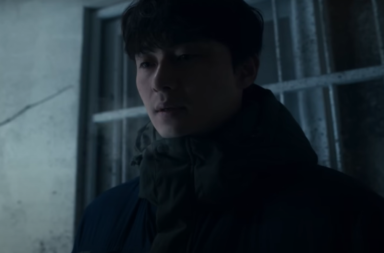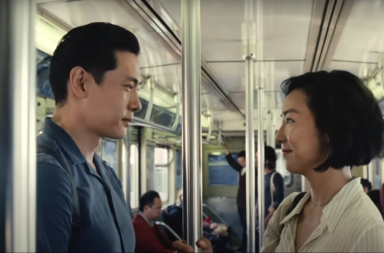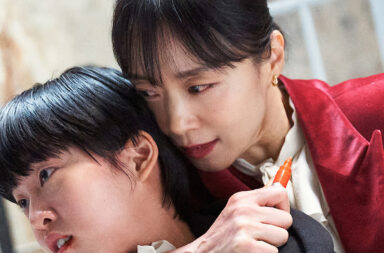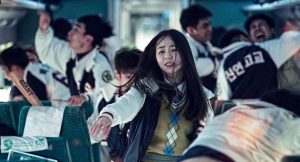
Each year near the picturesque shores of the French Riviera, the Cannes Film Festival, one of international cinema’s most prestigious events, takes place. On May 13, 2016, the South Korean zombie thriller Train to Busan premiered as part of Cannes’ Midnight Screenings section. It garnered immediate attention for its innovative scares and biting social critiques, and when it opened in South Korea later that summer, became a critical, commercial and cultural phenomenon. As Train to Busan celebrates its 4th anniversary, its director has announced a new Netflix show and a follow-up, titled Peninsula, is due for release later this year. It feels like a fitting time to examine the film’s legacy as a horror gem, a blockbuster, a part of South Korean cinema’s international rise, and a still relevant condemnation of societal corruption and inequality.
This article contains spoilers.
Train to Busan follows Seok-woo (Gong Yoo), a workaholic businessman and divorced father who, in a rare show of sensitivity, decides to indulge his young daughter Su-an’s (Kim Su-an) birthday wish to visit her mother. They board the KTX 101 train from Seoul to Busan just as strange incidences of violence begin to break out across South Korea. Their journey turns into a fight for survival when it becomes clear that a virulent disease is sweeping across both the nation and their train, transforming ordinary citizens into bloodthirsty zombies.
Prior to Train to Busan’s release, director Yeon Sang-ho was best known for the gritty animated features The King of Pigs and The Fake. Train to Busan was conceived as a sequel to Seoul Station, another Yeon animated movie. It was his live-action filmmaking debut and in an ironic twist, it was ultimately released one month before Seoul Station.
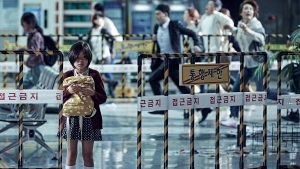
For someone that had never previously worked outside of the animated medium, Yeon demonstrates astonishing confidence and creativity in his direction of Train to Busan. The film is masterfully paced, alternating phrenetic action sequences with moments of simmering quiet. Zombies’ mindless, teeth-gnashing nature don’t make them the most versatile villains, but Yeon find ways to use them unrepetitively. Their physicality–sprinting after victims and congealing into piles perfect for rendering barriers useless–is engaging, if occasionally reminiscent of the 2013 American hit World War Z. Yeon’s background in animation shows in shots so meticulously composed, they look like they could be torn from the pages of a comic. All this, combined with a strong cast in broadly drawn but compelling roles, make for a wildly entertaining film that has been hailed as one of the best zombie movies ever made.
However, Train to Busan is more than a well-executed piece of entertainment. It’s also part of a long tradition of horror films which use fantastical terrors to shed light on all too real societal conundrums. Horror is an oft-derided genre, written off as campy, exploitative, and just plain gross. While there are certainly horror films that live up to these low standards, there are many others that take advantage of horror’s place on the margins of filmmaking to engage with subversive topics in inventive ways.
South Korean horror films seem particularly drawn to this genre-bending trend. The film industry in South Korea was limited by various forms of censorship until the late 1990s, but in subsequent decades, films like Whispering Corridors, The Host, and Living Death have examined topics such as corruption, dysfunction in the education system, environmental abuse, and religious zealotry through horror.

Train to Busan’s timely societal critiques played a major role in its phenomenal success in South Korea, where it attracted over 11 million moviegoers, roughly 1/5 of the population. 2 years before, the country had been rocked by the deaths of over 300 people, many of them high school students, in the Sewol ferry disaster. In 2015, South Korea was struck with an outbreak of MERS (Middle East respiratory syndrome) that claimed more than 30 lives. Both tragedies were compounded by bureaucratic incompetence and a government response that seemed to prioritize public relations damage control over transparency or the welfare of their citizens. These incidences, combined with growing concerns over economic disparities, created an anxious and pessimistic national atmosphere.
Into this context came Train to Busan, a brilliantly entertaining horror film that also had something to say about nearly every major South Korean societal concern. As previously noted, zombies’ purposeless and indiscriminate brutality can render them dramatically unengaging, but these same qualities make them a near perfect stand-in for disease. The scenes of hordes of infected undead wreaking havoc on cities, interspersed with a press conference in which a government representative calmly states that people have nothing to fear, feel like an exaggerated mirror of the experiences many South Koreans may have feared during the MERS outbreak.
When late in the film, Seok-woo discovers that the source of the zombies is the large company he works for, it serves as a sharp reminder of the costs of unchecked corporate greed. Even as the train passengers fight for their lives, they judge each other by the visible signs of each person’s economic status. The deaths of the working class Sang-hwa (Ma Dong-seok), students Yong-guk (Choi Woo-shik) and Jin-hee (Sohee) and a nameless homeless stowaway who sacrifices himself for Su-an and the pregnant Seong-kyeong (Jung Yu-mi) may come at the hands (and teeth) of zombies, but the film makes clear that they were largely caused by the selfishness of other people, most notably Yong-suk (Kim Eui-sung), an arrogant corporate executive. A zombie outbreak may be on the loose but Train to Busan’s underlying message is that it’s society that is truly sick.
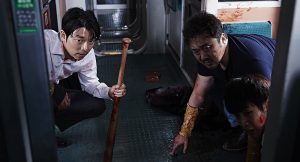
If this sounds like a bummer, it is. However, Train to Busan shows that one reason horror is such an effective vehicle for exploring subversive issues is because the genre is primed to provide thrills, levity, and catharsis alongside the societal analysis. It’s hard to sadly philosophize for long when you’re watching a film with heart-pounding action sequences around every corner. Horror is inherently comical in its excessiveness, and Train to Busan has many unexpected and maybe even unintended moments of humor, like when Yong-guk and Jin-hee call each other to confirm they are alive and conduct their conversation in loud, soap-opera worthy sobs. Catharsis is, of course, horror’s secret weapon. Within the exaggerated world of horror, anything is possible, from your deepest fears to your most secret wishes. The film’s boldest instance of catharsis comes from a sequence in which a group of passengers who had refused to help other survivors are eaten alive in slow motion, as dramatic orchestral music plays. It is certainly not the most subtle scene, but it speaks to a deep human desire for just deserts and is undeniably, if darkly, satisfying.
Train to Busan’s exquisite balance of horror thrills with subversive commentary, of entertainment with depth, and of light with darkness made it a critical and commercial success, both in South Korea and abroad. In the last 4 years, it’s proven to be a steadfastly relevant film with a significant legacy.

As arguably the first notable zombie film in South Korea, Train to Busan can take credit for the country’s slight uptick in zombie appearances in recent years. Most notably, there is the hit Netflix show Kingdom, which like Train to Busan, uses the horrors of the undead to examine the horribleness of the living. Train to Busan also propelled star Gong Yoo, previously best known for his role in the classic K-drama Coffee Prince, to an entirely different level of stardom as part of the actor’s stellar 2016. Ma Dong-seok’s turn as the lovable Sang-hwa helped him evolve from a supporting actor into a leading man, who has since helmed successful films such as The Outlaws and The Gangster, The Cop, and The Devil. He was also recently announced as a cast member for the upcoming Marvel film The Eternals.
The South Korean film industry has seen a rise in its international recognition and influence through the global success of movies like Oldboy, The Handmaiden, and of course, Parasite. Train to Busan deserves a place among these heavyweights as a film so undeniably good, it made an ambivalent, and even occasionally hostile global film community pay attention and give credit where credit was due. It’s worth noting that many of these films achieved their unique brilliance by intertwining genre filmmaking of many different kinds with subversive commentary.
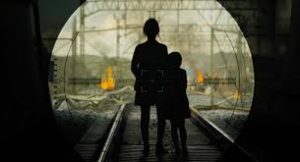
The specific combination of horror and societal critique which Train to Busan so masterfully executes is still alive and well, both globally and in South Korea. Moreover, the issues which the film examines remain a large part of the national psyche, making Train to Busan feel as relevant and timely as ever. A 2019 survey found that over 85% of South Korean respondents believed that income gaps were “very big” and that the barriers to upward mobility were significant. While the country and its government have been largely praised for their response to the ongoing Coronavirus pandemic, it seems fair to say that widespread anxiety about virulent outbreaks won’t be going away anytime soon. Government corruption and corporate maleficence remain concerns. Recent incidents include the resignation of the Justice Minister after widespread protests due to the fact that his family faced allegations of corruption, and a rare public apology (but with little clarification) from Samsung’s vice-chairman over the company’s controversial succession plans. Of course, South Korea is far from the only place to grapple with these issues, giving Train to Busan a relevance that extends beyond its home country’s borders to nations and people all over the world.
Train to Busan has stood the test of time, proving itself as an enduringly impactful, entertaining, innovative and subversive movie. It’s not just a film for fans of horror, Hallyu, or societal criticism that comes with a side of zombie. It’s a film for fans of good cinema, period.
(Al Jazeera, The Brookings Institute, The Diplomat, Film School Rejects, The Hollywood Reporter, The Indian Express, Indiewire [1][2], Inverse, The Korea Times, NPR [1][2], Reuters, Screen Daily, Vulture. Images via: Next Entertainment World)
